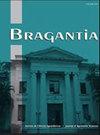Effects of Sesuvium verrucosum Raf. Compost and vermicompost on the growth and production parameters of the Solanum lycopersicum L. crop
IF 1.5
4区 农林科学
Q2 AGRICULTURE, MULTIDISCIPLINARY
引用次数: 0
Abstract
The objectives of this work were to use Sesuvium verrucosum to produce stable and mature compost and vermicompost and to evaluate their influence on the growth and production parameters of the Solanum lycopersicum L. crop. For the preparation of vermicompost, the earthworm Eisenia fetida (Savigny) was used. The proposed treatments were: T1 (negative control) [no organic fertilizer + urea], T2 (positive control) [bovine manure (100%) + urea], T3 (compost) [bovine manure (100%) + urea], T4 (compost) [S. verrucosum (25%) + bovine manure (75%) + urea], T5 (compost) [S. verrucosum (50%) + bovine manure (50%) + urea], T6 (compost) [S. verrucosum (75%) + bovine manure (25%) + urea], T7 (vermicompost) [bovine manure (100%) + urea], and T8 (vermicompost) [S. verrucosum (25%) + bovine manure (75%) + urea]. The results showed that all the treatments were stable, mature and rich in nutrients after 140 days. In general, treatments made from S. verrucosum showed a high pH (7.97–8.45) and electrical conductivity (3.83–8.85 dS m-1). Nonetheless, excluding T7, the treatments made from a proportion of 25% halophyte and 75% bovine manure (T8 and T4) achieved the highest morphological parameters in the different variables that were evaluated, as well as the highest yields compared to controls T1 and T2, followed by T3, T5 and T6, respectively. Therefore, it was concluded that S. verrucosum can serve as a stable and mature organic amendment, rich in nutrients, and that can be used to improve the growth and development of the S. lycopersicum crop.疣茸的作用。堆肥和蚯蚓堆肥对茄类作物生长和生产参数的影响
本研究的目的是利用疣草制备稳定、成熟的堆肥和蚯蚓堆肥,并评价其对茄类作物生长和生产参数的影响。以蚯蚓为原料制备蚯蚓堆肥。建议的处理为:T1(阴性对照)[无有机肥+尿素],T2(阳性对照)[牛粪(100%)+尿素],T3(堆肥)[牛粪(100%)+尿素],T4(堆肥)[S。疣粪(25%)+牛粪(75%)+尿素],T5(堆肥)[S。疣粪(50%)+牛粪(50%)+尿素],T6(堆肥)[S。疣体(75%)+牛粪(25%)+尿素),T7(蚯蚓堆肥)[牛粪(100%)+尿素],T8(蚯蚓堆肥)[S。疣体(25%)+牛粪(75%)+尿素]。结果表明,经过140 d,各处理均稳定成熟,营养丰富。从总体上看,疣子草处理的pH值(7.97 ~ 8.45)和电导率(3.83 ~ 8.85 dS - m-1)较高。尽管如此,除T7外,25%盐生植物和75%牛粪处理(T8和T4)的形态参数最高,产量也高于对照T1和T2,其次是T3、T5和T6。综上所述,疣状葡萄可作为一种稳定成熟的有机改良剂,具有丰富的营养成分,可用于促进番茄葡萄的生长发育。
本文章由计算机程序翻译,如有差异,请以英文原文为准。
求助全文
约1分钟内获得全文
求助全文
来源期刊

Bragantia
AGRICULTURE, MULTIDISCIPLINARY-
CiteScore
2.40
自引率
8.30%
发文量
33
审稿时长
4 weeks
期刊介绍:
Bragantia é uma revista de ciências agronômicas editada pelo Instituto Agronômico da Agência Paulista de Tecnologia dos Agronegócios, da Secretaria de Agricultura e Abastecimento do Estado de São Paulo, com o objetivo de publicar trabalhos científicos originais que contribuam para o desenvolvimento das ciências agronômicas.
A revista é publicada desde 1941, tornando-se semestral em 1984, quadrimestral em 2001 e trimestral em 2005.
É filiada à Associação Brasileira de Editores Científicos (ABEC).
 求助内容:
求助内容: 应助结果提醒方式:
应助结果提醒方式:


